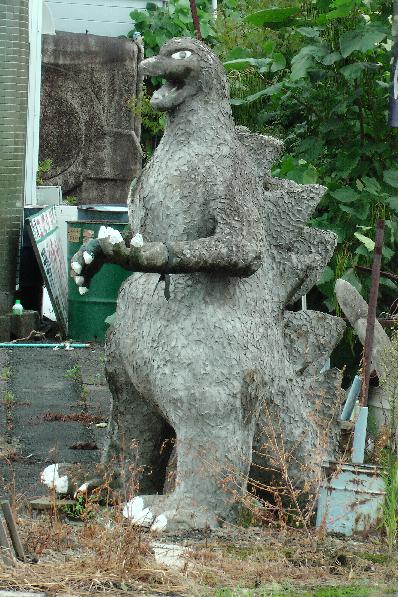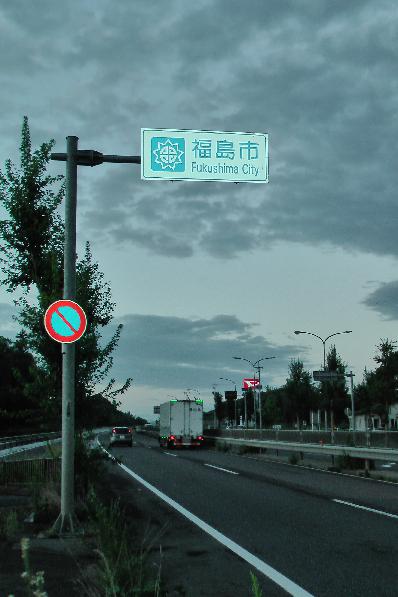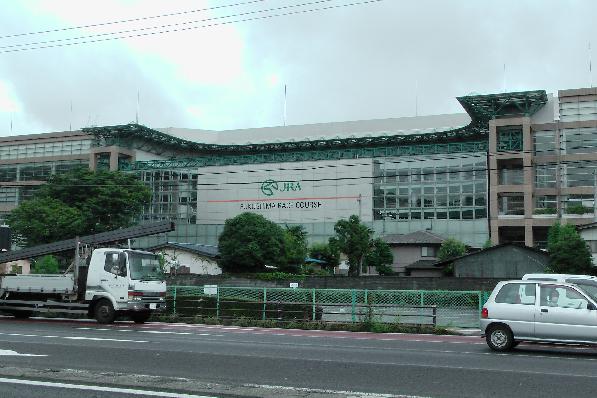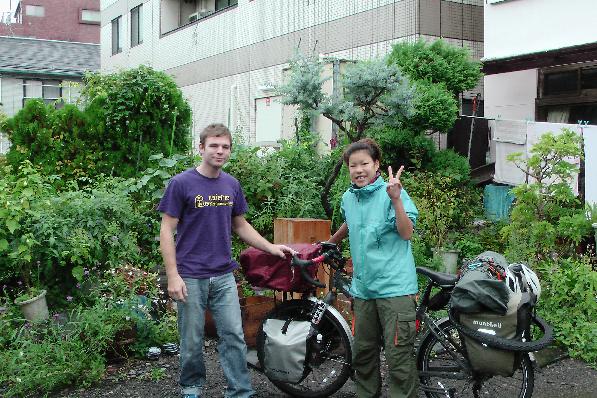From Utsunomiya I’m making my way via Koriyama to the 284.000 inhabitant small city of Fukushima. It’s a bit ironic. Since June I have been cycling through Japan and where do I face the first Godzilla on my journey? Although… it should have come into my mind way earlier why it is that way. Since Roland Emmerich’s Godzilla remake from 1998 most of us know what Godzilla likes. Well, what is it? Correct! On one hand there would be fish. Admittedly to enjoy this dish he could have chosen any sushi restaurant all over Japan. Born however was the giant mutated lizard on the Bikini atoll and, as we know, brought up with plenty of rays by U.S. American nukes. So fish and radioactivity. Ergo where does he feel home best? Right here in Fukushima. And this is how it is. Short before the entrance to the town I am being welcomed by Godzilla.
Well, against the background what happened here this is really evil satire. And I have to admit that I don’t feel comfortable to write that this way. I’m here to raise awareness of the problems and to help after all. Not to make fun of the situation. But this was really my first thought when I saw Godzilla here standing at the gates of Fukushima.
My host Reiko is from Malaysia. As she has to work during my estimated time of arrival she simply leaves the door to her apartment unlocked and describes to me how to get to her place. Astonishingly this seems to work pretty well here. You have to credit Japan really for one thing: It is a very safe country (well, except for it’s nuclear power plans of course). By the way Reiko is not my first host in Japan who handles it this way. However my first one who lives without a fridge / refrigerator. The food I just bought before I got to her place, especially the milk, has to stay overnight on her balcony. But it’s still up to 15°C at night. By the way milk is a certain topic. While being here in Fukushima I pay a lot of attention that it originates from the more than 500 km away Hokkaido. In 2011 the Japanese dairy company Meiji was criticized for selling radioactive milk powder. It’s evident. Cows belong to those animals which eat a lot of the radioactive grass infested by fallout. Meiji’s somewhat ambiguous advertising slogan: Brightening our customer’s lives through “Food & Health” seems a bit inartfully expressed.
But still life here seems to be back on again. If one can trust the sources in the internet, radiation here seems to be only slightly higher compared to other regions of Japan but distinctly below the radiation level which a human body absorbs during an international flight. The city itself is little spectacular. I don’t find anything which would meet the requirements to be captured by my camera’s lens. Neither conspicuous buildings or museums nor original beautiful parks. Fukushima has a horse racecourse. And even this building is not a big deal. Fukushima (prefecture) is known for it’s peaches amongst other things. But even if the radiation is not so high here it does not necessary mean that it is for the whole Prefecture. After the reactor catastrophe I don’t have any interest to try Fukushimas peaches.
On a rainy day I set forth for Sendai. When stopping nearby the horse race course to take some photos a Japanese girl passes me on her fully packed bicycle. I’m curious and leap onto my bicycle and catch her up at the next traffic light. She tells me that she is on her way from Tokyo to Aomori (in the north of Japan’s main island Honshu) and that Sendai would be her destination for today. I join her and we cycle together to Sendai. I’m lucky the country side is very flat here. Would there be mountains she would pass them by three times faster than me as she does not have to pull a trailer with her bicycle after all of course. Unlike me she’s got a tent with her. But it’s not really a pleasure to camp on such a rainy day. I’m telling her about couch surfing – which is new to her – and offer that I ask my host if it would be okay to host her as well for one night.
It’s almost dark for two hours now when we arrive at 7 p.m. in Sendai. At the meeting point my host Vyacheslav set up I approach him at first to explain the situation pointing to Nozomi waiting in the rain on the other side of the street holding her bicycle. Of course it’s a bit awkward for me to bring someone to my host without any advanced notification, but also mention that she has a tent. But Vyacheslav is totally cool about it and beckons her across the street towards us. Nozomi and I share one room for ourselves in which I discover music instruments I’ve never seen before in my life. Nozomi explains to me that this plucking instrument was a Koto and the bowed instrument was a Kokyū. Nozomi only stays for one night and leaves on the next morning.
Vyacheslav and his wife Helen are both from the Ukraine. Yes, they already went through two nuclear disasters in their life. Both are – as I find it – very interesting people which is why I ask them to give me an interview and a little concert. My wish will be obliged:
Sendai von Daaaaaaaaaaaax
Special thanks to: Mattew Hahn, U.S.A. (text revision); Reiko Ng, Malaysia; Helen & Vyacheslav Onyshchenko, Ukraine; Hubertus Neidhart from Webspace Provider Network for excellent web page hosting services; Lilith Pendzich







2 comments
Slavik
October 14, 2012 at 1:10 pm (UTC 0) Link to this comment
:) You got me when I was drunk, or, it would be better to say, you had no other time to get us.
Come again we will play better :) Anyway, have a good trip and come again!
See you!
admin
October 14, 2012 at 1:27 pm (UTC 0) Link to this comment
It’s not your fault! The radiation just affected my microphone. So that is why it sounds a bit weird. Thanks for the offer :)